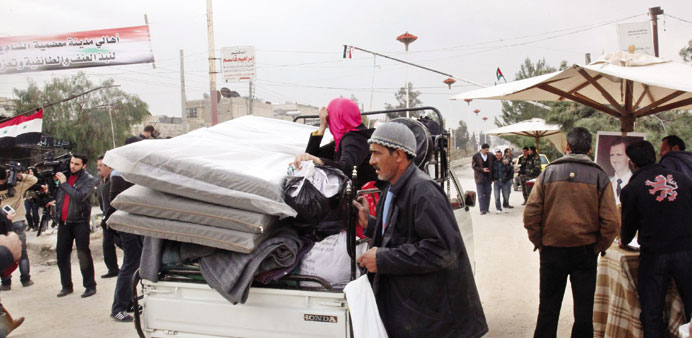A truck loaded by residents and their stuff crosses into al-Moadamiya suburb as citizens return to their homes, in Damascus yesterday. According to local sources, residents are returning following a recent reconciliation between the Syrian government and rebels battling to overthrow the regime. In a government-organised tour, journalists were taken to the area to oversee the return of families and the delivery of foodstuff offered by the UNRWA to the area.
Firefights and shelling rocked the Palestinian camp of Yarmuk in southern Damascus yesterday, killing a man and breaking a weeks-old truce, said a group that monitors the Syrian conflict.
“There was shelling of Yarmuk and fighting between (the Al Qaeda-linked) Al-Nusra Front and the Popular Front for the Liberation of Palestine-General Command (PFLP-GC),” the Syrian Observatory for Human Rights said.
“The truce has been broken,” its director Rami Abdel Rahman told AFP.
Each side blamed the other for breaking the ceasefire.
The truce had taken hold on February 10 in Yarmuk, where some 40,000 people have been living in inhumane conditions since mid-2013, after Al-Nusra Front withdrew its fighters from the camp.
A fragile respite had allowed in limited aid by the UN agency for Palestinian refugees in recent weeks.
On Sunday, however, Al-Nusra Front accused the regime of Syrian President Bashar al-Assad and its allies from the PFLP-GC of breaking their side of the deal.
It said the jihadists had initially agreed to withdraw because of the poor humanitarian situation, but that “a very small number of food parcels” had been distributed in comparison to the agreed amounts.
Activists in Yarmuk confirmed via the Internet that Al-Nusra Front members re-entered the camp yesterday, and also reported shelling and fighting inside.
“I was out filming and suddenly the shelling started. You should have seen the children: they were terrified,” said one of them, Rami al-Sayed.
“There are no civilians on the streets. Everyone’s afraid and hiding in their houses because of the shelling and sniping,” he added.
Sayed also said that throughout the truce, “the only medical relief that made it into Yarmuk was smuggled in, and in tiny amounts”.
The pro-Assad PFLP-GC blamed Al-Nusra Front for breaking the accord by re-entering the camp.
“This morning, Al-Nusra Front returned once again to Yarmuk camp, disrupting the peace initiative whose aim was to address the tragedy of the hostage camp,” said spokesman Anwar Raja.
Chris Gunness, spokesman for the UN Relief and Works Agency (UNRWA), said on Twitter: “Bad news: looks like there were no UNRWA food distributions today in the besieged Palestinian refugee camp of Yarmuk.”
Since January, UNRWA has distributed little more than 7,500 food parcels in the camp, calling this “a drop in the ocean compared with the rising tide of need”.
After months of shelling and fierce fighting in and around Yarmuk between rebels and Assad loyalists, the camp’s population has shrunk from more than 150,000 to 40,000. Among them are 18,000 Palestinians.
Truce allows displaced to visit besieged homes
Displaced residents returned yesterday to their homes near Damascus thanks to a truce in a rebel-held town that Syria’s army besieged more than a year ago, an AFP journalist said.
Among the returnees was a veiled mother of two who said she had come back to Moadamiyet al-Sham, southwest of the capital, for the first time in 14 months.
Speaking near an army checkpoint on the edges of the rebel-controlled area, the 40-year-old, who refused to give her name, said: “We’ve been told everything is calm now, so we’ve decided to return just to see the house.” Moadamiyet al-Sham was once home to 100,000 people, but fighting, bombing and an army blockade forced tens of thousands to seek shelter elsewhere.
Some 15,000 people still live in the town, and have benefitted from the lull in fighting and the entry of food and other humanitarian supplies since rebels and the regime signed a truce in December.
But without basic services, few of those who fled Moadamiyet al-Sham for other parts of Syria or beyond are willing to go back, even in the long run.
“We will return for good if there’s water and electricity,” said the woman who was accompanied by her two children.
The AFP journalist was not allowed through the army checkpoint into the rebel area, but saw that most of those trickling in were women, children and elderly people.
At the entrance, a banner read: “Residents of Moadamiyet al-Sham want to banish violence and sectarianism, and reinforce national unity.”

